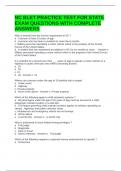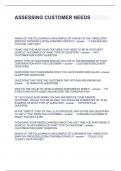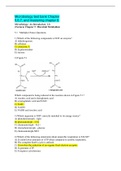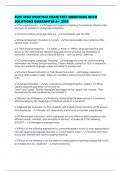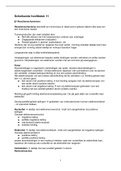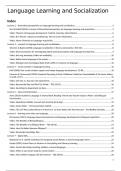Judge, T., Piccolo, R.F., & Kosalka, T. (2009). The bright and dark sides of leader traits: A
review and theoretical extension of the leader trait paradigm. The Leadership Quarterly,
20(6), 855-875.
The earliest conceptions on leadership focused on individual differences
-this approach was deemed too simplistic
-dangerous and a product of self-delusion
Critics of the five factor model/ Big Five
-personality has low predictive power of job performance
-personality is not useful to predict effectiveness (or success)
-the selection of the five factors is insufficiently justified and are too broad for insights
-decontextualize account of human nature
-blends of the five traits are more useful than the distinct categories
Aim: review leader trait approach and provide agenda for future research: look at the trait
‘fitness’
-positively valanced traits – bright traits
-negatively valanced traits – dark traits
Three theoretical approaches that underlie the trait approach
1 evolutionary theory and psychology
a) Provides theory for the existence of certain traits
-psychological traits develop form mutation/ adaption ad selection
-reason human possess certain individual traits is because these facilitate leadership, so
they facilitate fitness
-leader enhances opportunity of procreation and are beter able to adapt and survive
because of their beter position
-followers: make the best of a bad hand and shared leadership also proves successful
-so certain traits are evidence for advantages of survival, fitness and sexual fitness
b) Efficacy of traits
-explanation of the effectiveness of traits
-leader emergence is different from leadership effectiveness (certain set of traits may be
more advantageous than others (may depend on the context)
-circularity that benefits the leader (the better the leader the more effective the group)
-frequency dependent selection (trait of a leader increases this trait in others)
Positive frequency dependent selection – leader benefits from group increase of a common
trait
Negative frequency selection – leader benefits from group decrease of a common trait
c) Paradox of traits
-certain traits that lead to advantages might become disadvantageous later or in a different
context
1c – the salutary effects of trait at one time may be reversed when the situation changes
,-leadership conditions change quickly and pose new complex requirements of leaders
-mismatch between traits of leaders and contemporary demands
2c- traits rarely have unalloyed advantages or disadvantages in one time point
-antagonistic pleiotropy (certain gene mutations may be favorable and disadvantageous at
the same time)
- this would suggest that a trait which aids one's ascension to or success as a leader, might in
other ways represent threats to one's success or survival as a leader
- just as certain characteristics may have countervailing effects on fitness, so too might they
have similar effects on leader effectiveness
3c – non-linearities in the effect of trait on fitness or leadership outcomes
-traits might not have linear effects on fitness or leadership outcomes
-certain curvilinearities are to be expected for traits
2 behavioral genetics
-studies show that leadership is heritable (30-60%)
-half of the variance in personality is heritable
-situational variables have a genetic source: environmental measures are strongly related to
genes
-people seek out there environments because of their genes
-genes interact with the environment and do not exist independently
-environmental effects are mediated by biological processes
-phenotype is selected in or out
1 selective neutrality – selection is blind to individual differences
2 mutation selection balance – selection does not eliminate individual differences
3 balancing selection – selection itself maintains genetic variation
-so behavioral genetics provide an explanation to why leaders are born (is rooted in genes)
3 socio-analytic theory
-the degree to which success is predicted on individual differences
Rooted in 2 (or 3) assumptions about motives
1 getting along (communion) vs getting ahead (agency)
2 identity (how you see yourself) vs reputation (how you are seen by others)
-identity best assessed with self-report measures
-reputation best assessed with observer appraisal
-so revising measures of leadership outcomes > performance of the unit for which the
leader is responsible
3 finding meaning (Hogan and Shelton)
-leader has to provide meaning for their followers (inspiring followers)
The Leader Trait Emergence Effectiveness heuristic Model (LTEE)
-integrates behavioral genetics and evolutionary psychology
-distinguishes leadership emergence and effectiveness
-distinction between subjective and objective leadership effectiveness
, -moderating influences from: traits to leader emergence and from leader emergence to
leadership effectiveness
Three sections of the model
1 causes of traits
Genetics box – provides the genotype (genetic source of traits)
Traits box – provides phenotype
Selection processes – traits become into existence because they have been useful at solving
adaptive problems
- genes determine the expression of traits (as observed in trait measures, of phenotypes),
but evolutionary processes, in organizations and in collectives more generally, determine
which traits are “selected in” and “selected out.”
2 traits, leader emergence and socio-analytic theory
-traits affect leader emergence
-traits elicit certain motives (that lead to leader emergence)
-take into account the trait paradoxes (traits have bright and dark sides)
3 leadership effectiveness and moderators
-leader emergence is linked to subjective and objective effectiveness
-objective effectiveness – hard outcomes as group performance
-subjective effectiveness – perceived by stakeholders
-the emergence of subjective and objective effectiveness are moderated by contextual
factors
-moderators subjective effectiveness: traits and implicit leadership theories (ILT)



